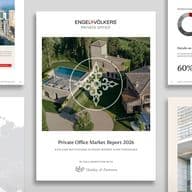
Sell successfully with Engel & Völkers
It's promising: Our worldwide network of earmarked prospective buyers.

This tax is determined from the difference between a property’s purchase price and its sale price. Has the property currently being sold increased in value over time? If so, the real estate gains tax goes up correspondingly. However, the vendor may be able to claim investments or expenses here in order to reduce the tax burden.
Important: The determining factor for tax jurisdiction is the canton in which the property being sold is located. The real estate gains tax is payable by the vendor alone.
Switzerland's real estate gains tax is what is known as a property tax. The assessment is based on the gain (profit). The gain is in turn derived from the difference between the current sales proceeds and the asset value.
Important: The rate used for calculating the real estate gains tax is based not only on the amount of the gain but also on the length of ownership. A higher tax must therefore be paid on short-term realised gains in most cantons. For lengthier ownership, the tax burden is reduced accordingly.
The definition of a land parcel is set out in Article 655 of the Swiss Civil Code (ZGB). The term ‘land parcel” includes:
properties,
autonomous and permanent rights entered in the Land Register,
mines,
joint ownership of land parcels.
Article 2 of the Direct Taxation Harmonisation Act stipulates that the cantons must levy a real estate gains tax. The Confederation does not collect real estate gains taxes.
An owner who earns a profit from the sale of property as part of private assets (depending on the canton, possibly also business assets) is liable for tax under Article 12 of the Direct Taxation Harmonisation Act.
The taxation itself is governed by different regulations depending on the canton. The respective cantonal tax laws apply.
A profit is made on the sale of a property when the vendor receives more than he/she paid for the property. Thus the sales price less the investment costs equals the profit.
Incidentally, other items can be included in the profit in addition to the pure sales price, for example in the case where the vendor concludes an additional contract for further services to the property (for example an extension) when selling the property. Investment costs can usually be deduced from the publicly certified purchase contract; alternatively, the tax authority can use the property’s tax base for the calculation.
However, investment costs include not only the old or original purchase price or tax base of the property now being sold. Investment costs also include
value-enhancing expenses such as renovations, refurbishments and similar
deductions provided for by law.
Value-enhancing expenses in this sense are defined as all expenses that permanently increase the value of the property - in other words, updates, conversions and development costs. Important: The individual cantonal regulations apply here.
Deductions provided for by law are defined as additional ways to reduce the tax burden. Thus, vendors can claim costs such as the expense for property transfer or the brokerage commission.

It's promising: Our worldwide network of earmarked prospective buyers.
We will now go into a little more detail to provide you with an initial summary of the different cantonal taxation systems.
The “monistic” system applies in these cantons: The real estate gains tax is payable as a special tax for all profits from the sale of real estate. Whether this is a sale of private or business assets is irrelevant here.
In the canton of Geneva, income / profit tax are due in addition to the real estate gains tax. The tax applies to commercial and legal entities. In order to avoid double taxation, taxpayers can deduct the property gains tax paid in their tax return.
In the remaining cantons, the “dualistic” system applies in which only natural persons may be taxed under this special tax when selling their private assets. The capital gains of legal entities and traders are taxed as income / profit tax.
The “proportional” rate applies in eleven cantons (Aargau, Appenzell Ausserrhoden, Basel City, Freiburg, Geneva, Nidwalden, Obwalden, Tessin, Thurgau, Uri, Waadt). This means equal tax rates regardless of the amount of profit. In these locations, the tax burden is reduced according to length of ownership – the longer one has owned the property being sold, the lower the tax.
The “progressive” rate applies in the remaining cantons. Here the rate is determined by the amount of profit.
In most cantons, real estate gains tax is not levied on so-called small profits. However, there are considerable variations in the tax allowances depending on the canton.
Thus in the cantons of Thurgau, Tessin, Wallis and Neuenburg, profits from property sales are tax-free only if the tax to be paid would not exceed a specific amount (between 30 and 100 CHF). In contrast, the tax-free amount in Basel City rises to 500 CHF and in Lucerne to 13,000 CHF.
On the other hand, the cantons of Uri (with 10,000 CHF) and Schwyz (2,000 CHF) grant a general tax deduction that applies to a property sale in the calendar year.
As we have already stated above, the vendor is always liable for taxation in the sale of property or real estate.
But from a tax point of view. there are nuances as regards who exactly can be asked to pay Normally, this is firstly the property owner as defined under civil law -- that is, the person whose name is recorded in the Land Register. In the event that another person has “power of disposition” over the property, this person can also function as the vendor.
And what happens if the vendor fails to pay the real estate gains tax? In this case, either other owners - if any - or the purchaser are liable. However, the tax authority may also claim the lien on the property.
The tax obligation is also regulated differently depending on the canton. For example, in the cantons of Bern, Jura and Neuenburg, persons entitled to a share of the profits, as defined by corresponding laws or contracts, are also liable to tax.
It is important for property vendors to know that tax liability they will incur as the vendor of the property on the day the property is transferred (in the Land Register). Under certain circumstances, it is possible to obtain a so-called tax deferral for the payment of the real estate gains tax.
Tax deferral signifies that the real estate gains will become taxable only upon the next property transfer.
When can the real estate gains tax be deferred?
Inheritance (legal succession, bequest, estate distribution, advancement of inheritance)
Transfer of ownership between family members
Establishment, modification or dissolution of the matrimonial property regime
Gifts
Restructuring
Exchange of two comparable properties located in the same canton without premium
Sale of an owner-occupied residential property (under the condition that the sales profit is promptly used to acquire a substitute property)
Reallocation of building land (subject to other precisely defined conditions!)
Replacement procurement of operationally required fixed assets
For agricultural and forestry properties: Improvement, replacement procurement (subject to other precisely defined conditions!)
In some situations, deferral can even mean a waiver of real estate gains tax. That would be the case if the vendor of the property uses the profit to acquire a new personal residence within a legally determined period and lives there for the rest of his/her life. In such a situation, therefore, he/she would never be subject to the real estate gains tax.
In addition, real estate gains tax is not levied in some special cases involving expropriations and administrative acts. The real estate gains tax is also not payable by non-profit organisations, the Confederation, cantons and municipalities, regional churches and similar.
You are urged to consult your tax authority in a timely fashion prior to the sale. Our estate agency is also available to answer any questions you may have.
You may also be interested in








Contact


Engel & Völkers Switzerland
Poststrasse 26
6300 Zug | Switzerland
Tel: +41 41 500 06 06